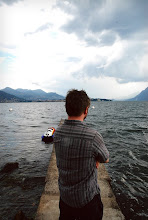 No one had seen much of Jon in the last two, maybe three years, other than those who had made the effort to not be defeated by the un-returned call after un-returned call and either speak to his parents or just invite themselves round unannounced. It was the only way to see him. It was hard to understand why Jon even still had a mobile phone, considering the lengths he was taking to remove himself from the outside world so comprehensively.
No one had seen much of Jon in the last two, maybe three years, other than those who had made the effort to not be defeated by the un-returned call after un-returned call and either speak to his parents or just invite themselves round unannounced. It was the only way to see him. It was hard to understand why Jon even still had a mobile phone, considering the lengths he was taking to remove himself from the outside world so comprehensively.And yet, given that it has been around three years (certainly two) since he gave up on pretty much everything, the presence at Jon's funeral was startling and even life-affirming. That man will be missed, and he will be missed by a lot of people, many of whom hadn't seen him in the best part of ten years, let alone even knew he was an alcoholic. Jon died at the age of thirty-one due to alcoholism. This is extreme, tragic and unacceptable.
The atmosphere at the funeral service, the wake and the gathering afterwards (where a select dozen or more of Jon's old friends met for a late meal) was as good as could only be hoped for. Perhaps it was because there was still enough youth to go around, seeing as most of us were still only aged around the thirty mark, but people seemed quick to joke and remember that Jon was a joker, a genuinely, appealingly funny man. I was told that the eulogy I performed for him read more like a best man speech than what it was. This was a compliment in every respect, but any joke I made, any comical reminiscence made public once more in front of a particularly rammed St Peters Church, Monkmoor, stemmed from Jon himself, his actions, his willingness to entertain, and his words.
Thirty-one. It is unacceptable that he should leave us so young. We will not, and should not, be attending each others' funerals for decades to come. Jon was the first to leave us, and it is already opportune emotional strategy to imply that the love towards him, the respect shown for the effect he had so many he knew is down to simply dealing with his loss: say everything nice you can about him, it makes it all so much easier. But it is so much more than that. Jon really did represent the best of us. He actually was that decent, justifiably loved to that degree, leaving this world with not a single person to have a bad word against him. In the intervening years before we all start passing away (I don't mean to sound morbid with this train of thought) we may all make mistakes, things to move on from, things to learn and live by - Jon didn't really get chance to do these things. Alcoholism could be seen as his biggest mistake, but he never had chance to clean up. The chance never came to learn and move on. This is unnaceptable, yet accept it we must.
At the funeral, his mother and father and younger sister Andrea (pictured here with Jon) held it together as best as they could, but there was a distance you could see in them. He had fallen so ill under his parents' roof. None of us can imagine the despair this must have caused them. Many of us have lost a dearly loved friend but they saw their first child slowly die. Yet people pulled together as best as they could for his funeral, the last ever moment where everyone could get together all at once in tenderness and show each other what he meant to them. This makes things a little more acceptable, when people travel from all corners of the country to say goodbye by being there, talking about him, and laughing at the appropriate times, which, regarding Jon's relentless sense of humour, should have been all the time. Indeed it was all the time that day.
Many of the male friends at the funeral couldn't hold it together, particularly when his coffin was slowly lowered into the earth. It may be easy to understand that many of us will have been thinking that could have been me. To go from such a person of joy to this in a mere thirty-one years displays how easy it is to become lost, never to be found again in time simply because you don't want to even find yourself. The mortality of it is distressing, how easy it could be to slip under. Jon was on the same path as the rest of us for so long, joking and playing, and no one seemed to notice when he chose to leave.
Jon, it feels as if we barely knew you, yet you will be so missed.



No comments:
Post a Comment